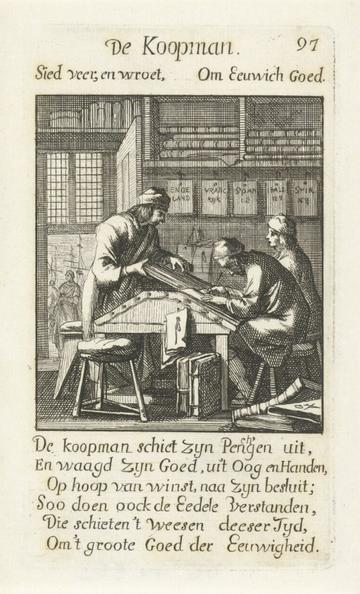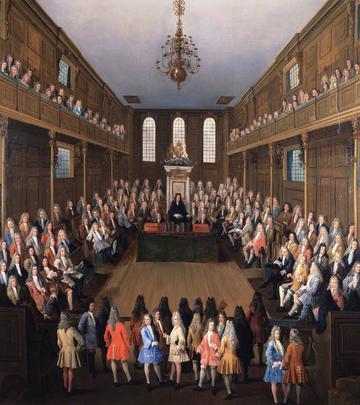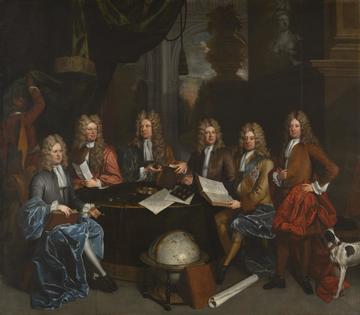Parliamentary Culture and Public Credit: How Merchants Overcame Their Weak Position
One of the main reasons that economists and political scientists have shown increasing interest in the early history of European parliaments involves the idea that the presence of these bodies allowed rulers to make credible commitments to not interfere with the affairs of merchants. This could then help lead to good economic outcomes such as growth of incomes and the development of public finance. These scholars have then asked what particular configuration or design for a parliament would be most likely to lead to this outcome. The simple answer that I proposed to this question in a book that I published ten years ago, States of Credit, was that a parliament was most likely to produce credible commitment of this sort when merchants had a great deal of influence within it, especially by sheer weight of numbers. The question I would like to ask in this blog post is whether the emergence of credible commitment was something that depended not just on the sheer weight of numbers, but also on parliamentary culture. I will suggest that certain elements of a parliamentary culture, including public debate and the formation of stable alliances, allowed for mercantile groups to gain considerable influence even when they were heavily outnumbered within a parliament.
Scholars in the social sciences have often suggested that the presence of parliaments may help to explain Europe’s economic takeoff relative to other world regions. This argument, when expressed in its most simple form, is not very convincing given that parliaments arose a half millennium or more before the economic takeoff. We are on more solid ground with another claim often made by social scientists, and this is that the presence of a parliament could establish a credible commitment that public debt would be repaid. To the extent that public borrowing was necessary for state development—as well as for state survival in an era of frequent warfare—the presence of a parliament could have then given certain states a leg up on others.

'The Merchant'. Engraving by Caspar Luyken, Amsterdam, 1694.
In States of Credit I examined parliamentary activity and public credit in a broad set of European polities between the thirteenth century and the end of the eighteenth. To gain leverage on the problem I considered not only Europe’s territorial states and whether they had a parliament, but also Europe’s many city-states which also had town councils that could have had a similar positive effect on public credit. The broad answer I found was that city-state assemblies were associated with an early access to public credit and at lower interest rates but parliaments in larger “territorial states” were not. In the case of the city states this was largely because the same individuals who lent heavily to the state also dominated a town council, and they could therefore ensure that actions were taken, such as raising taxes on common consumption goods, to make sure that public debt would be serviced. In the case of territorial state parliaments, it was much less common for merchants to have the same degree of influence, given the presence of large landowners (who did not tend to lend to the state) as well as sometimes the clergy. On average, territorial states with active parliaments had no better access to credit than did territorial states with parliaments that were less active or even absent.
In States of Credit I treated the difference in public credit outcomes between city-state and territorial state assemblies as largely one of numbers, with different social groups being represented to different degrees. Is it possible that parliamentary culture also had something to do with all this?
It would certainly be possible to argue that merchants sitting on the town councils of Europe’s city-states reinforced their influence not only through their sheer weight of numbers but also through the use of various symbols that referred to the importance of commerce. But that, I think, is not the most interesting conclusion one could draw regarding parliamentary culture and public credit. What was most interesting in my mind was the way that, in the British case, a particular parliamentary culture in Westminster helped lead to stable public credit even though merchants were in the minority.

The English House of Commons in Session, c. 1709.
A particular parliamentary culture could substitute for sheer weight of numbers for merchants in two ways: through the formation of alliances and through the development of a broader national debate. We can learn a great deal about the above issues by contrasting early modern Britain and the Dutch Republic. The Dutch Republic preceded England in establishing a secure form of public credit by more than a century, and from an early date it was eventually able to borrow at rates as low as three percent per annum, something that was unheard of in the territorial states of Europe at this time. The Dutch Republic was able to do this because even though political power was distributed relatively evenly over various cities and the countryside, it still followed the city-state model of giving all power to the merchants through sheer weight of numbers.
While the Dutch Republic initially had an advantage over Britain when it came to public credit, the British state did eventually catch up, and by the middle of the eighteenth century it too was borrowing abundantly at rates as low as three percent per annum. How did this happen? I would like to suggest that it happened because of Britain’s peculiar parliamentary culture.
After 1688, the state of public credit in Great Britain was fundamentally linked to the fortunes of the Whig Party, a parliamentary coalition of different interests, both landed and monied, that in practice adhered to a common platform on issues involving foreign policy, religious toleration for dissenting Protestants, and also public credit and commerce. Once the Whigs became dominant after 1715, public credit was at its most secure, something that I wrote about in my 2003 book entitled Public Debt and the Birth of the Democratic State.

Painting of the so-called 'Whig Junto', which led the Whig party during the reigns of King William III and Queen Anne of England. Painted by John James Baker, 1710.
Now the fact that something like the Whig Party – or the Tory Party for that matter – could even exist was greatly facilitated by a particular aspect of Britain’s parliamentary culture: the absence of imperative mandates. Many early modern European polities, including the Dutch Republic, relied on a system whereby those who chose representatives to a parliament also gave them strict mandates or instructions regarding what they could do. This was an effective way for distant constituents to control their representatives, but it also helped to promote particularism, and it hindered the sort of horse trading that was necessary for a diverse coalition like the Whig party to actually function. Britain was different in that the practice of mandates for representatives to the House of Commons disappeared as early as the fourteenth century. This eventually allowed a very different type of parliamentary culture to develop.
There was also a second critical way in which Great Britain’s parliamentary culture was different, and this was with the way in which debates about commerce and public credit occurred not only in the private setting of parliament, but also among a broader public. Once again, a contrast between Britain and the Dutch Republic can prove very instructive for making this point. To do so, I am going to rely on the conclusions of Emily Erikson, a sociologist at Yale, who recently published a book entitled Trade and Nation: How Companies and Politics Reshaped Economic Thought.
One of the great curiosities of European political development is that while the Dutch Republic has rightly been called the “first modern economy,” as argued by the economic historians Jan de Vries and Ad van der Woude in a book of the same name, it did not develop what one could call the first modern parliamentary culture. This would instead happen in Britain.
Arguably, one of the key features of a modern parliamentary culture is that debate occurs both inside and outside of the parliamentary chamber. In her recent book Emily Erikson argues that the development in Britain of a robust public political debate about commerce and economics helped allow mercantile interests – otherwise a small minority in Parliament – to exercise outsize influence on government policy. Individuals associated with the great trading companies were the instigators here. While a robust public debate about economics developed in Britain, Erikson, shows that nothing of this sort happened in the Dutch Republic. Her explanation for this is that the overwhelming influence of merchants meant that little public debate was necessary. Rather than try to convince others of the wisdom of their views, merchants in Dutch assemblies could simply rely on their sheer numbers to steer policy in the direction they wanted. Paradoxically, mercantile dominance of politics – a product of being the first modern economy – meant that there was no need to develop a modern parliamentary culture.
In the end it seems clear that parliamentary culture had a great influence on public credit in Early Modern Europe. It did so in surprising ways that allowed for the shift to a modern economy and to a more modern state in a case like Britain where merchants could not dominate by sheer weight of numbers. Perhaps social scientists ought to pay greater attention to parliamentary culture when they think about the economic and political consequences of Europe’s early parliaments.
David Stasavage, Dean for the Social Sciences and Julius Silver Professor of Politics, New York University.


